National poet: Difference between revisions
| Line 43: | Line 43: | ||
*[[China]] - [[Du Fu]], [[Li Bai]], [[Lu Xun]] |
*[[China]] - [[Du Fu]], [[Li Bai]], [[Lu Xun]] |
||
*[[Cambodia]] - [[Preah Botumthera Som]], [[Krom Ngoy]], [[Chuon Nath]] |
*[[Cambodia]] - [[Preah Botumthera Som]], [[Krom Ngoy]], [[Chuon Nath]] |
||
*[[India]] - [[Rabindranath Tagore]], [[Bankim Chatterjee]], [[Kālidāsa]], [[M. Govinda Pai]], [[Kuvempu]], [[G. S. Shivarudrappa]] |
*[[India]] - [[Subramania Bharati]], [[Rabindranath Tagore]], [[Bankim Chatterjee]], [[Kālidāsa]], [[M. Govinda Pai]], [[Kuvempu]], [[G. S. Shivarudrappa]] |
||
*[[Iran]] - [[Ferdowsi]], [[Rumi]], [[Hafez]], [[Rudaki]], [[Nizami Ganjavi|Nezami Ganjavi]], [[Saadi Shirazi|Saadi]], [[Omar Khayyám]], [[Nasir Khusraw]], [[Adib Boroumand]] |
*[[Iran]] - [[Ferdowsi]], [[Rumi]], [[Hafez]], [[Rudaki]], [[Nizami Ganjavi|Nezami Ganjavi]], [[Saadi Shirazi|Saadi]], [[Omar Khayyám]], [[Nasir Khusraw]], [[Adib Boroumand]] |
||
*[[Iraq]] - [[Maarouf Al Rasafi]] |
*[[Iraq]] - [[Maarouf Al Rasafi]] |
||
Revision as of 13:16, 3 April 2015


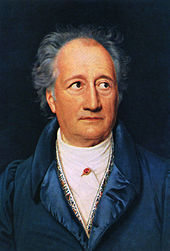
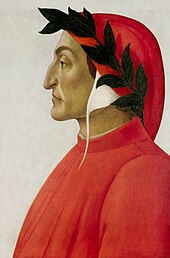
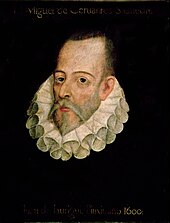
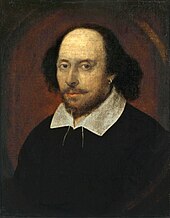
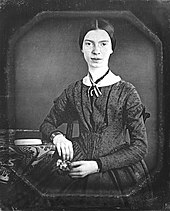

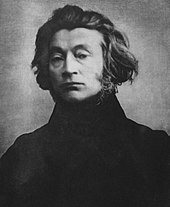
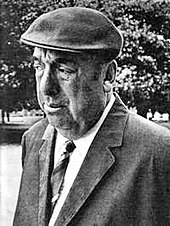


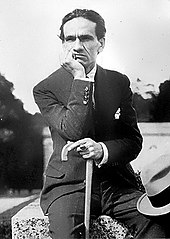


A national poet or national bard is a poet held by tradition and popular acclaim to represent the identity, beliefs and principles of a particular national culture.[1] The national poet as culture hero is a long-standing symbol, to be distinguished from successive holders of a bureaucratically-appointed poet-laureate office. The idea and honoring of national poets emerged primarily during Romanticism, as a figure that helped consolidation of the nation states, as it provided validation of their ethno-linguistic groups.[1]
Most national poets are historic figures, though a few contemporary writers working in relatively new or revived national literatures are also considered "national poets." Some nations may have more than one national poet; the idea of a single one is always a simplification. It has been argued that a national poet "must write poetry that closely identifies with the nation's cause – or is thought to do so",[2] with an additional assumption being "that a national poet must write in a national language".[3]
The following is a list of nations, with their associated national poets. It is not a list of sovereign states or countries, though many of the nations listed may also be such. The terms "nation" (as cultural concept), "country" (as geographical concept) and "state" (as political concept) are not synonyms.
Africa
- Algeria - Si Mohand
- Angola - Agostinho Neto
- Egypt - Ahmed Shawqi
- Ethiopia - Tsegaye Gabre-Medhin
- Mali - Fily Dabo Sissoko
- Morocco - Mohammed Awzal
- Nigeria - Chinua Achebe
- Senegal - Léopold Sédar Senghor
- Somalia - Hadrawi
- South Africa - Mazisi Kunene
- Sudan - Gely Abdel Rahman
- Tanzania - Shaaban bin Robert[4]
- Tunisia - Aboul-Qacem Echebbi
Asia
- Afghanistan - Khushal Khan Khattak,[5] Ferdowsi
- Azerbaijan - Fuzûlî, Imadaddin Nasimi, Samad Vurgun
- Bangladesh - Kazi Nazrul Islam[6]
- China - Du Fu, Li Bai, Lu Xun
- Cambodia - Preah Botumthera Som, Krom Ngoy, Chuon Nath
- India - Subramania Bharati, Rabindranath Tagore, Bankim Chatterjee, Kālidāsa, M. Govinda Pai, Kuvempu, G. S. Shivarudrappa
- Iran - Ferdowsi, Rumi, Hafez, Rudaki, Nezami Ganjavi, Saadi, Omar Khayyám, Nasir Khusraw, Adib Boroumand
- Iraq - Maarouf Al Rasafi
- Israel - Hayim Nahman Bialik, Yehuda Amichai, Yehuda Halevi
- Japan - Koizumi Yakumo, Murasaki Shikibu
- Jordan - Mustafa Wahbi al-Tal
- Kazakhstan - Abai Qunanbaiuli, known as Abai Kunanbaev
- Korea - Kim Sowol, Ko Un
- Kurdistan - Khana Qubadi
- Kyrgyzstan - Toktogul Satylganov
- Lebanon - Kahlil Gibran, Said Akl
- Malaysia - Usman Awang
- Mongolia - Dashdorjiin Natsagdorj, Byambyn Rinchen, Hadaa Sendoo
- Myanmar - Min Thu Wun
- Nepal - Laxmi Prasad Devkota, Motiram Bhatta
- Pakistan - Allama Muhammad Iqbal
- Palestine - Mahmoud Darwish
- Philippines - Francisco Balagtas
- Saudi Arabia - Ghazi Abdul Rahman Al Gosaibi
- Sri Lanka - Ananda Samarakoon
- Syria - Nizar Qabbani
- Tajikistan - Rudaki, Ferdowsi, Saadi, Molavi, Nasir Khusraw, Sadriddin Ayni, Gulnazar Keldi
- Thailand - Sunthorn Phu
- Turkmenistan - Magtymguly Pyragy
- Uzbekistan - Abdulla Oripov, Erkin Vohidov, Gʻafur Gʻulom, Mirtemir
- Vietnam - Nguyễn Du, Nguyễn Đình Chiểu
- Yemen - Abdullah Al-Baradouni
Europe
- Albania - Gjergj Fishta, Naim Frashëri
- Andorra - Albert Salvadó
- Armenia - Hovhannes Tumanyan, Sayat-Nova, Paruyr Sevak
- Austria - Franz Grillparzer, Peter Rosegger, Johann Nepomuk Nestroy
- Basque Country - Joseba Sarrionandia
- Belarus - Yanka Kupala, Yakub Kolas
- Belgium - Emile Verhaeren, Maurice Maeterlinck
- Bosnia and Herzegovina - Izet Sarajlić
- Bulgaria - Hristo Botev,[7] Ivan Vazov
- Catalonia - Jacint Verdaguer
- Croatia - Marko Marulić, Miroslav Krleža
- Cyprus - Vasilis Michaelides
- Czech Republic - Karel Hynek Mácha, Božena Němcová, Jan Neruda
- Denmark - Adam Oehlenschläger
- England - William Shakespeare[8]
- Estonia - Lydia Koidula, Friedrich Reinhold Kreutzwald
- Faroe Islands - William Heinesen
- Finland - Johan Ludvig Runeberg, Elias Lönnrot
- Flanders - Hendrik Conscience, Guido Gezelle, Hugo Claus
- France - Victor Hugo, Charles Baudelaire
- Friesland - Gysbert Japicx
- Galicia - Rosalía de Castro
- Georgia - Shota Rustaveli
- Germany - Johann Wolfgang von Goethe, Friedrich Schiller
- Gibraltar - Héctor Licudi
- Greece - Homer, Dionysios Solomos
- Guernsey - George Métivier
- Hungary - Sándor Petőfi
- Iceland - Jónas Hallgrímsson, Hallgrímur Pétursson, Halldór Laxness
- Ireland - Thomas Moore, William Butler Yeats
- Italy - Dante Alighieri (known as Dante), Giosuè Carducci, Giacomo Leopardi, Ugo Foscolo, Gabriele D'Annunzio
- Kosovo claimed by Serbia - Din Mehmeti, Ali Podrimja
- Latvia - Rainis, Andrejs Pumpurs
- Liechtenstein - Peter Kaiser
- Lithuania - Kristijonas Donelaitis, Maironis
- Luxembourg - Edmond de la Fontaine (known as Dicks), Michel Rodange, Michel Lentz
- Macedonia - Kočo Racin, Georgi Pulevski and Kole Nedelkovski
- Malta - Dun Karm Psaila
- Moldova - Mihai Eminescu, Grigore Vieru
- Monaco - Louis Notari
- Montenegro - Petar II Petrović-Njegoš
- Netherlands - Joost van den Vondel, Jacob Cats
- Norway - Henrik Wergeland
- Poland - the Three Bards: Adam Mickiewicz, Juliusz Słowacki, Zygmunt Krasiński; Jan Kochanowski
- Portugal - Luís de Camões, Fernando Pessoa
- Romania - Mihai Eminescu
- Russia - Alexander Pushkin
- San Marino - Pio Chiaruzzi
- Scotland - Robert Burns, Hugh MacDiarmid, John Barbour, Edwin Morgan
- Serbia - Jefimija, Princess Milica of Serbia, Oskar Davičo, Vladislav Petković Dis, Vuk Stefanović Karadžić, Stefan Lazarević, Desanka Maksimović, Vuk Stefanović Karadžić,[9] Petar II Petrović-Njegoš (Yugoslavia, Serbia and Montenegro)[10]
- Slovakia - Pavol Országh Hviezdoslav
- Slovenia - France Prešeren
- Spain - Miguel de Cervantes, Lope de Vega,[1] Federico García Lorca
- Sweden - Carl Michael Bellman, Gustaf Fröding, Verner von Heidenstam, Esaias Tegnér
- Switzerland - Gottfried Keller, Carl Spitteler
- Turkey - Mehmet Akif Ersoy
- Ukraine - Taras Shevchenko
North America
- Canada - Pauline Johnson
- Quebec - Émile Nelligan, Gaston Miron, Octave Crémazie, Gilles Vigneault, Félix Leclerc
- Cuba - José Martí
- Dominican Republic - Pedro Mir
- Guatemala - Miguel Ángel Asturias
- Haiti - Jacques Roumain
- Mexico - Ramón López Velarde, Octavio Paz
- Nicaragua - Rubén Darío
- Panama - Ricardo Miró[11]
- Saint Lucia - Derek Walcott
- United States - Walt Whitman, Emily Dickinson, Robert Frost, Carl Sandburg, Maya Angelou
Oceania
- Australia - Henry Lawson, Adam Lindsay Gordon, Dorothea Mackellar, A. B. "Banjo" Paterson
- New Zealand - Katherine Mansfield, Janet Frame
South America
- Argentina - José Hernández,[12] Jorge Luis Borges
- Brazil - Gonçalves Dias, Olavo Bilac, Carlos Drummond de Andrade, Joaquim Maria Machado de Assis.
- Chile - Pablo Neruda, Gabriela Mistral
- Colombia - Rafael Pombo
- Ecuador - José Joaquín de Olmedo, Jorge Enrique Adoum
- Peru - César Vallejo
- Uruguay - Juan Zorrilla de San Martín
- Venezuela - Rómulo Gallegos, Andrés Eloy Blanco
References
- ^ a b c Nemoianu, Virgil (2002). Esterhammer, Angela (ed.). “'National Poets’ in the Romantic Age: Emergence and Importance.” Romantic Poetry. John Benjamins Publishing. p. 537. ISBN 9789027234506.
- ^ John Neubauer, "Figures of National Poets", in Marcel Cornis-Pope and John Neubauer, eds., Figures of National Poets (2004), p. 11.
- ^ Michael Baron, Language and Relationship in Wordsworth's Writing (1995), p. 13.
- ^ J. Cameron; W. A. Dodd (17 May 2014). Society, Schools and Progress in Tanzania: The Commonwealth and International Library: Education and Educational Research. Elsevier Science. pp. 57–. ISBN 978-1-4831-5914-0.
- ^ Attention: This template ({{cite doi}}) is deprecated. To cite the publication identified by doi:10.1080/03068376008731684, please use {{cite journal}} (if it was published in a bona fide academic journal, otherwise {{cite report}} with
|doi=10.1080/03068376008731684instead. - ^ Aparna Chatterjee, Kaazi Nazrul Islam; The National Poet of Bangladesh : A Profile Study on The Literary Shelf, Boloji.com. Accessed 9 March 2007.
- ^ Hristo Botev’s birth anniversary, Radio Bulgaria History and Religion, posted January 6, 2007, updated on January 12, 2007, accessed 9 March 2007
- ^ Michael Dobson (17 November 1994), The Making of the National Poet - Shakespeare, Adaptation and Authorship, 1660-1769, Clarendon Press, ISBN 978-0-19-818323-5
{{citation}}: Cite has empty unknown parameter:|1=(help) - ^ Philip V. Bohlman (28 October 2013). Central European Folk Music: An Annotated Bibliography of Sources in German. Taylor & Francis. p. 91. ISBN 978-1-136-50806-6.
the Serbian national poet, Vuk Stefanovic Karadzic
- ^ Balazs Trencsenyi; Michal Kopecek (1 November 2006). National Romanticism: The Formation of National Movements. Central European University Press. p. 431. ISBN 978-963-7326-60-8.
Characteristically, although Njegoš saw himself as a definitely Serbian poet, his epic came to be later canonized as the most important work of 'Yugoslav' literature [...]
- ^ Daniel Balderston, Mike (2004). Encyclopedia of Latin American and Caribbean Literature, 1900-2003. Routledge. p. 666. ISBN 0-415-30687-6.
- ^ James Woodall, Borges: A Life, Basic Books (1996). ISBN 0-465-04361-5. Relevant excerpt available on the New York Times web site, accessed 9 March 2007.
Further reading
- Marcel Cornis-Pope and John Neubauer, eds., Figures of National Poets (2004)
- Edward Whitley, American Bards: Walt Whitman and Other Unlikely Candidates for National Poet (2010)
- Michael Dobson, The Making of the National Poet (1992)
- Josep R. Llobera, Foundations of National Identity (2004)
